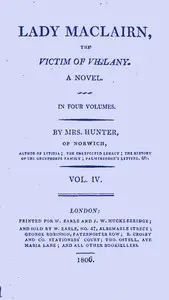"The History of England in Three Volumes, Vol. I., Part B" by David Hume is a historical account written in the late 19th century. The work explores significant events and figures in English history, focusing particularly on the transitional period from the reign of Henry III to Richard III. Hume seeks to provide a narrative that balances thoroughness with the need for brevity, illuminating how pivotal moments shaped the trajectory of the English monarchy and its relationship with the nobility and the church. The opening portion introduces the reign of Henry III, emphasizing the weaknesses and caprices of this monarch alongside the political dynamics and dissatisfaction among the barons. The narrative outlines how Henry was initially supported by the Earl of Pembroke, who became the protector during his minority, and describes the investment of authority in the protectorate, amid ongoing civil strife. As the political landscape shifts, the barons' growing dissatisfaction and subsequent revolts underscore the fragile nature of Henry's rule, characterized by outside influences like the papacy and internal power struggles leading to his lack of control over both his court and his country. (This is an automatically generated summary.)

The History of England in Three Volumes, Vol. I., Part B. From Henry III. to Richard III.
By David Hume
"The History of England in Three Volumes, Vol. I., Part B" by David Hume is a historical account written in the late 19th century. The work explores s...
David Hume was a Scottish philosopher, historian, economist, and essayist who was best known for his highly influential system of empiricism, philosophical scepticism and metaphysical naturalism. Beginning with A Treatise of Human Nature (1739–40), Hume strove to create a naturalistic science of man that examined the psychological basis of human nature. Hume followed John Locke in rejecting the existence of innate ideas, concluding that all human knowledge derives solely from experience. This places him with Francis Bacon, Thomas Hobbes, John Locke, and George Berkeley as an empiricist.


















